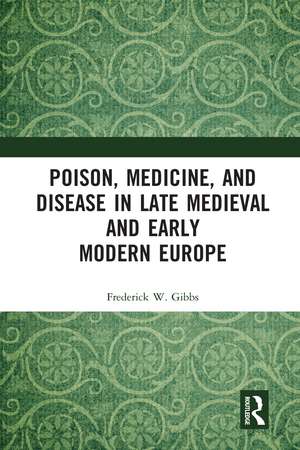Poison, Medicine, and Disease in Late Medieval and Early Modern Europe
Autor Frederick W Gibbsen Limba Engleză Paperback – 30 iun 2020
Preț: 389.99 lei
Nou
Puncte Express: 585
Preț estimativ în valută:
74.62€ • 78.12$ • 61.75£
74.62€ • 78.12$ • 61.75£
Carte tipărită la comandă
Livrare economică 07-21 aprilie
Preluare comenzi: 021 569.72.76
Specificații
ISBN-13: 9780367588267
ISBN-10: 0367588269
Pagini: 332
Dimensiuni: 156 x 234 x 18 mm
Greutate: 0.47 kg
Ediția:1
Editura: Taylor & Francis
Colecția Routledge
Locul publicării:Oxford, United Kingdom
ISBN-10: 0367588269
Pagini: 332
Dimensiuni: 156 x 234 x 18 mm
Greutate: 0.47 kg
Ediția:1
Editura: Taylor & Francis
Colecția Routledge
Locul publicării:Oxford, United Kingdom
Cuprins
Contents;
Acknowledgements;
Introduction;
1. Classical Authorities and Traditions
The ambiguity of pharmaka and venena.
Prevention, symptoms, and remedies.
Medical pharmacotherapy and theories of poison.
Compilation, synthesis, and specific form.
Conclusion
2. Poison and Venom in the Latin West before 1300
Poisons and venoms in translation.
Encyclopedic poisons.
Qualities, quantities, and forms.
Regulating poisonous drugs.
Conclusion.
3. Towards a New Toxicology
Food, medicine, and poison.
A new kind of poison text.
New "problems" of poison.
Patronage, poison, and medical learning.
Conclusion.
4. Plague, Poison, and Metaphor
Putrefied and poisoned air.
Plague as poison in the body.
Spreadable and contagious poison.
Conclusion.
5. Poisonous Properties, Bodies, and Forms
Occult definitions and forms.
Poisonous properties.
Poisonous bodies.
Poisoning, sorcery, and the evil eye.
Sympathetic forms.
Conclusion.
6. Poison, Putrefaction, and Ontology of Disease
Poisons, contagions, and the French Disease.
Poison as cause of disease.
Separating poison and medicine with Paracelsus.
Ontologies of poisons, forms, seeds, and disease.
Conclusion.
7. Reframing Toxicology
Reconciling the language of medicine and poison.
New approaches to venenum.
Poisons, venoms, and corruptions in the body.
Conclusion
Epilogue
Bibliography
Acknowledgements;
Introduction;
1. Classical Authorities and Traditions
The ambiguity of pharmaka and venena.
Prevention, symptoms, and remedies.
Medical pharmacotherapy and theories of poison.
Compilation, synthesis, and specific form.
Conclusion
2. Poison and Venom in the Latin West before 1300
Poisons and venoms in translation.
Encyclopedic poisons.
Qualities, quantities, and forms.
Regulating poisonous drugs.
Conclusion.
3. Towards a New Toxicology
Food, medicine, and poison.
A new kind of poison text.
New "problems" of poison.
Patronage, poison, and medical learning.
Conclusion.
4. Plague, Poison, and Metaphor
Putrefied and poisoned air.
Plague as poison in the body.
Spreadable and contagious poison.
Conclusion.
5. Poisonous Properties, Bodies, and Forms
Occult definitions and forms.
Poisonous properties.
Poisonous bodies.
Poisoning, sorcery, and the evil eye.
Sympathetic forms.
Conclusion.
6. Poison, Putrefaction, and Ontology of Disease
Poisons, contagions, and the French Disease.
Poison as cause of disease.
Separating poison and medicine with Paracelsus.
Ontologies of poisons, forms, seeds, and disease.
Conclusion.
7. Reframing Toxicology
Reconciling the language of medicine and poison.
New approaches to venenum.
Poisons, venoms, and corruptions in the body.
Conclusion
Epilogue
Bibliography
Notă biografică
Frederick W. Gibbs is Associate Professor in the Department of History at the University of New Mexico, USA.
Descriere
This book presents a uniquely broad and pioneering history of premodern toxicology by exploring how late medieval and early modern (c. 1200–1600) physicians discussed the relationship between poison, medicine, and disease. Drawing from a wide range of medical and natural philosophical texts—with an emphasis on treatises that focused on poison, p
